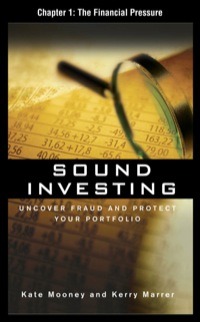Question
How can we make a profit if we sell at a price below costs? The cost report Ive just received indicates a cost of $2.79
How can we make a profit if we sell at a price below costs? The cost report Ive just received indicates a cost of $2.79 per pound for our 0.50-inch steel springs. If we accept John Lawsons offer to buy 120,000 pounds of 0.50-inch springs at only $2.48 per pound, what benefit do we get? How can we survive in this business if we keep slashing our prices?
Wendy Stone is the owner of High Performance Springs, a manufacturer of high precision steel springs for industrial customers. She was meeting with Bill Nace, her marketing manager, and Rick Koch, her controller, to evaluate an offer from Lawson Corporation to purchase a large quantity of 0.50-inch springs at sharply reduced prices. Her question followed Ricks comments about the costs and price of this product.
Our accounting records show that the full cost of the 0.50-inch springs is $2.79 per pound, which breaks down to $1.38 of direct materials, $0.76 of direct labor, and $0.65 of manufacturing support costs. We usually mark up our products 30% over costs, which implies a markup of $0.84 and a price of $3.63 per pound for the 0.50-inch springs. This means that Lawson is demanding a discount of $1.15 per pound, which is almost 32% off our normal price, Rick had observed earlier.
Bill realized that Ricks comments about the product costs and Wendys reaction to it meant that he could not justify his proposal simply by appealing to the value of developing a reputable firm such as Lawson Corporation as a large customer. He had to make a case for accepting a lower price by comparing the price with the incremental costs (or revenues) of producing the springs. The incremental cost per unit of a product is the amount by which the total costs of production and sales increase when one additional unit of that product is produced and sold.
It is true that the full cost of the 0.50-inch springs is $2.79, but that includes $0.65 of manufacturing support costs. We know that manufacturing support costs consist of rent, depreciation, insurance, heating and lighting, janitorial services, and so on. These are fixed costs and will not increase if we accept Lawsons order. So the only costs we need to consider are materials and labor, which add up to only $2.14. Even at a price of $2.48, we can earn a margin of $0.34 per pound, Bill explained.
Bill is right about rent, depreciation, and insurance being fixed costs, replied Rick. But such fixed costs are only 60% of our total manufacturing support at present. Support activities also include supervision, setups, and inspection, whose costs will increase if we accept the Lawson order. Variable manufacturing costs for the 0.50-inch springs are $1.38 direct materials, $0.76 direct labor, $0.26 variable support activity costs. This adds up to $2.40 of variable costs, so it seems we would have a contribution margin of $0.08 per pound. But that is before we consider selling and distribution costs, which will, I believe, add another $0.23 to the variable costs of the 0.50-inch springs. I figure the total variable costs to be $2.63 per pound, which is more than the offer of only $2.48 per pound.
Bill asked, Well, should we counter Lawsons offer by suggesting that we would accept it for a $2.70 price? That would earn us a contribution margin of $0.70 per pound by your calculations.
Before Rick could respond, Wendy interrupted the discussion: Im very confused by all this talk about only variable costs. Costs are costs. I pay for rent and insurance just as I pay our workers and our suppliers. If our customers dont pay me a price that covers all our costs --- both fixed and variable --- I cant possibly make money in this business.
Required:
- Should High Performance Springs slash the price of its 0.50-inch springs from $3.63 per pound to $2.48 per pound to obtain business from a reputable customer, The Lawson Corporation? Should it make a counteroffer of $2.70 instead, to cover all its variable manufacturing and selling costs even though full costs amount to $2.79 per pound? How would High Performance cover the related costs if the selling price covers only the variable costs?
- What other factors the company should consider in its decision to accept or reject the offer made by Lawson Corporation?
- Evaluate whether High Performance Springss decision would be ethical if it accepts John Lawsons offer.
Step by Step Solution
There are 3 Steps involved in it
Step: 1

Get Instant Access to Expert-Tailored Solutions
See step-by-step solutions with expert insights and AI powered tools for academic success
Step: 2

Step: 3

Ace Your Homework with AI
Get the answers you need in no time with our AI-driven, step-by-step assistance
Get Started


